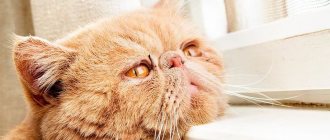12563Administration
2
The cause of death for cats can be serious illness, injury, old age, or an accident. Anticipating an imminent end, the animal often leaves its home, never to return. It is natural that the question arises why cats leave home to die. After all, even if the pet does not have the opportunity to leave the apartment, it simply hides in an inaccessible place, for example, somewhere in a closet.
There is no clear answer as to why this happens. There are several versions of this pattern, none of them have been scientifically confirmed.
Causes and characteristic symptoms of approaching death
The lifespan and death of domestic cats, like all other living creatures, depends on many factors. These include natural aging, genetics, injury, poisoning, illness, and even psychological causes such as chronic stress.
The diseases that most often cause death in cats include:
- Chronic renal failure resulting from urolithiasis. Sterilized animals have a metabolic disorder, due to which they require specialized nutrition and drinking regimen. If you continue to feed your cat as usual, stones form in the kidneys and bladder, which cause pain, severe inflammation, impaired urine flow, and swelling. If treatment is started immediately after the first symptoms are detected, the disease can be managed.
- Cancerous tumors that can affect various organs. Just like in humans, cancer in cats can occur at any age. Most often, malignant neoplasms are detected in cats in the uterus, lymph nodes (lymphoma), mammary glands, brain and liver. It will not be possible to completely cure the animal, but timely surgery and medication will significantly prolong the pet’s life and alleviate its condition.
- Bacterial, viral and fungal infections, to which kittens, unvaccinated and free-ranging adult cats are most susceptible. A sick animal definitely needs the help of a veterinarian and medicine. The body can cope with mild infections on its own in 4-5 days, otherwise the condition deteriorates very quickly, becomes critical and it will no longer be possible to help the pet. There are infections that develop rapidly. An animal that is vigorous in the morning already shows severe symptoms of intoxication by the evening.
Why the pet suddenly died will only be known after an autopsy at the veterinary clinic. It’s better not to take risks and consult a specialist.
Any change in the behavior of a domestic cat should be a reason for careful observation. This will help to recognize both the onset of the disease and the symptoms of dying in time.
An elderly pet or one suffering from a chronic illness behaves quite characteristically before its death. The owners note this and mentally prepare for the departure of a family member.
The following signs indicate imminent death:
- Significant slowing of heart rate. Normally, a cat's heart rate is 130-230 per minute. If the heart beats 60 times or less, then the animal dies. You can determine your pet's pulse by pressing your fingers tightly to the chest under the left front paw. Usually, 15 seconds are taken for measurements and counted down, after which the result is multiplied by 4. A slow heart rate is associated with severe hypotension, but it is impossible to measure a cat’s blood pressure without special devices.
- Frequent hoarse breathing. 20-30 inhalations and exhalations per minute are considered normal for a healthy animal. If the cat breathes frequently, sticks out its tongue, and wheezing, whistling or gurgling sounds are heard, then we are talking about severe hypoxia and dysfunction of the cardiovascular system. Sometimes a dry cough appears when exhaling. This indicates the development of obstruction and bronchopulmonary insufficiency.
- Critical decrease in body temperature. When taking measurements, the thermometer will show values significantly lower than the required 37.5. A dying cat's paw pads and ears will be cold.
- Refusal of food and water. Several days before death, the animal does not touch the bowls. The urine becomes dark, the stool is absent or very dry and streaked with blood. Usually, shortly before death, pets suddenly and noticeably lose weight, the pelvic bones and spine begin to stick out, and the sides collapse. Some cats take food and drink from the hands of their owners, but they do this more out of love and a desire to please.
- The toilet is in the wrong place. A clean and well-mannered pet may begin to go to the toilet past the tray, and urination may occur in its sleep.
- Pungent or putrid odor. Before death, the cat’s metabolism goes astray, toxins are not eliminated, and the breakdown of proteins from the muscles begins. People dying from cancer smell especially strongly. With chronic renal failure, a strong ammonia odor appears. The kidneys fail to cope with their filtering function, urine retention occurs, and waste products are released through sweat and skin secretions.
- Ungroomed appearance of fur. The cat stops licking itself, the fur becomes dull and rolls into icicles and tangles. In some cases, the underfur comes out in shreds to the point of bald spots. The eyes droop, the gaze becomes dull and cloudy. A previously affectionate cat may stop recognizing family members, lie detachedly in one place, and completely withdraw into itself. The pupils of a dying animal will lose their reaction to light and will be greatly dilated.
- Loss of coordination. Animals, before they die, may lose orientation in space, bump into objects, stagger, and fall when walking.
- Convulsions, seizures, prolonged sleep or loss of consciousness. The agony can last for several hours. In it, the cat is tormented by convulsions, after which it falls into oblivion for a while. Saliva may appear in the mouth as a white foam.
- Particular tenderness and affection towards the owner. The cat foresees its death and fawns over the person, saying goodbye. Some seemingly weakened pets begin to run and play. So they want to show a kind of concern for the mental state of a loved one, showing that life goes on.
- Craving for loneliness. Cats that have access to the outdoors prefer to move away from home before they die. Pets also hide, looking for dark corners where no one will see them.
The kitten's last journey
Unfortunately, not only old and frail cats die, but also very small kittens. When you are waiting for the birth of kittens, you must prepare for the fact that some babies will not live. The most dangerous period for a newborn kitten is the first two weeks of its life. The condition that a baby experiences before death is called fading kitten syndrome. When a kitten dies, most often nothing can be done, but sometimes, if timely measures are taken, it can be saved.
Below are the main reasons why kittens die:
- Hypothermia or hypothermia.
- Incompatibility of blood between kitten and mother.
- Hypoglycemia or low blood sugar.
- Dehydration or dehydration.
- Reasons related to difficult childbirth and mother.
- The first birth of a young and inexperienced cat.
- Anomalies and defects in newborn kittens associated with cat obesity.
- The kitten is underweight.
- Unsuitable conditions for the development of a kitten.
- Improper cat nutrition.
- Infectious diseases (viral, bacterial, parasitic).
Small kittens die suddenly or slowly, within 5-10 days, fade away. The signs of a large number of diseases in newborn kittens are very similar. Healthy kittens always huddle together and sleep quietly between feedings. You can understand their imminent death by their anxiety. Sick babies often lie down separately, they are not calm, they suck poorly, they squeak pitifully, asking people for help.
Outwardly, the kitten, doomed to death, looks unkempt, its fur is not smoothed, it moves swaying and trembling. Unlike adult cats, kittens never leave home and most often remain in the nest until their last breath. They also often die next to their mother or person.
Why do cats go away and hide before they die?
The most logical explanation for an old or sick cat's desire to leave the house is related to the ancient instinct that domestic pets inherited from their wild ancestors.
The animal feels and understands its vulnerability well in this state. Intuitively, they look for a secluded and safe place to lie down and not become prey to other predators. For the same reason, cats that have never been outside the walls of the house still look for a secluded corner.
Animal psychologists sometimes say that the desire to retire before death is associated with the independent and proud character of cats. They don't want to be seen as weak or dead.
Animals that are especially attached to their owners can thus protect them from sadness and grief.
There are also more mystical explanations for why a cat runs away from home. They are associated with the myth that these animals can foresee the future and see subtle worlds. Allegedly, in this way, they take upon themselves the misfortune that threatens the owners and their home, and die in their place.
Various superstitions and signs
Why cats love boxes and bags: why do they climb into them?
Popular wisdom says that if a cat died unexpectedly, while he was cheerful the day before, then you should pay attention to the circumstances under which this happened:
- if one of the family members is to blame for the death, then this means a quick theft that a loved one can commit without being caught;
- if a pet died due to household appliances, then you should expect problems at work;
- if a pet falls from a height, then this is fraught with family problems, even divorce;
- if the animal is poisoned, then you should beware of casual acquaintances, you should not suddenly change your life, do rash actions both in your career and in your personal life;
- if the cat died as a result or during a fight with another animal, then you should expect a dirty trick from close friends.
There are a lot of superstitions and signs associated with cats.
Ways to make a dying cat feel better
Loving owners, as a rule, also understand that life is leaving their pet. They notice changes in the well-being and behavior of their furry friend. It is natural to want to do something to ease the last few hours.
You can say goodbye and send off your last journey with dignity by staying at home with the animal, perhaps taking a day off from work and canceling plans. It is better to hold a weakened cat in your arms longer, stroke it, and let it know how dear it is to you. Next to its person, the animal will feel safe and less anxious.
It is important to provide your cat with maximum comfort. To do this, it’s good to make a soft, warm bedding and put a heating pad with warm water in it. Once every two to three hours, the animal should be carried to the tray and to bowls with clean water and soft food.
If an old pet has incontinence, you should put an absorbent diaper on the bedding, which needs to be changed frequently.
A very weakened cat can be fed a specialized liquid diet and watered from a syringe. It is important to prevent parasites from getting into the ears and fur. They easily settle on a cat that has lost its natural immunity and are very annoying.
If the animal is seriously ill, you can increase the dose of analgesics or antispasmodics, or put in a dropper with a nutrient solution.
For palliative treatment, you can invite a veterinarian to your home. He will teach you how to properly care for a pet in serious condition. He will explain how to properly give injections, massage and feed sick cats.
What to do after death and how to come to terms with loss
The cat can be buried in a special cemetery for animals or in the backyard (for example, in the country)
To survive a loss, you need to maintain some consistency. First you need to say goodbye to your pet's body. After the funeral, you can mourn the cat. Mourning an animal is useful, it makes it easier for a person to let go of a pet. After this, you need to remove objects that remind you of the cat: toys, bowl, tray, etc. However, all this is just a dry instruction; the person himself must realize that life goes on, and that it is time to let his friend go. Of course, the memories will still remain. But let these be bright and pleasant memories. After a couple of years, love and light sadness should remain in the memory, and not heavy depressing grief.
I remember every cat my family has ever had. Some of them lived long lives, while others died in childhood. We had a white kitten, Bim. He died on the third day from the plague. No one had time to play with him, and no one had time to get used to him. But I remember with a smile how fluffy he was. So fluffy that the ears were not visible in this root, and it looked like a lump. And I really wanted to cuddle him, but my parents forbade him.
Often, to forget about the loss, people get a new kitten. This is a good way to shift attention, but it is not suitable for everyone. In each case, the death of a pet is experienced differently, so there cannot be a single recommendation. To survive this sad event, a person must go through all the stages of grief himself. The main thing is that there is no feeling of guilt. Everything else will be corrected by time, because it heals.
Video: what awaits animals after death
Those who do not adhere to religious beliefs may imagine another option for life after death. On forums about saying goodbye to your beloved cats, you can find phrases such as “walk your furry paws on the rainbow”, “meet me on the bridge”, etc. According to one of the myths, the soul of a pet goes to a better world (cat paradise), which is located over the rainbow. When the time comes, the cat will climb onto the rainbow bridge to meet its owner there.
Mr. Cat explains: funeral
After death, the animal’s body must be buried with dignity and, importantly, correctly. Many veterinary clinics offer pet cremation services, however, in the event that the animal died in the hospital or was euthanized there.
For those who have passed into another world at home, special pet cemeteries provide their services. They are in large cities. A place for a grave or an urn with ashes is provided for a fee. There, owners can set up a place in memory of their pet and visit him.
Most people prefer to bury their dead cats themselves. This is not recommended by sanitary and epidemiological standards, but is practiced everywhere.
There are a number of rules that will help you comply with environmental and ethical standards when burying remains:
- It is better to choose a part of the park that is deserted and far from walking trails and other animals. You can make a grave in the forest. Sometimes pets are buried with relatives in a human cemetery. You need to know that burying animals on the owner’s personal property is not prohibited, but for a similar act in a public place you will have to pay a fine.
- The grave must be deep enough, at least one meter, so that it will not be dug up by dogs or predatory animals attracted by the smell of decomposition. A shallow burial may be washed away by rain. It is very important to take care of the cleanliness of nearby ground sources. If there are springs or springs nearby, it is better to choose another place.
- A stone placed on the pet’s grave, a flower bed or a planted tree can play an aesthetic and memorable role. The owners will be able to visit the place where the pet is buried. This will help them get over the breakup easier.
The cat left home and did not return: what to do
If the animal does not appear at home for a long time, then you need to go in search of it. If it lived in a country house or in a village, then you can find it by posting advertisements in places where there are a lot of people.
In an urban environment, you can find a fugitive through animal search websites, social networks, and open groups.
Note! If the cat has a chip, you can find it by its signal. It is best for the pet to have a collar on which the data for communication with the owner is written.
Psychological experience of loss
The loss of a pet has a serious impact on the emotional state of all family members. Don't hold back your emotions and tears. If you can’t survive the melancholy on your own, it is better to seek help from a psychologist. A good way to console yourself would be to spend time with your family or chat with cat owners who have already experienced a loss previously on a special forum or in a group on social networks.
Particular attention should be paid to the feelings of children. Due to their age and lack of life experience, they cannot cope with grief on their own. The death of a beloved friend becomes a serious psychological trauma. They begin to dream about the deceased animal, they see it in folded clothes or objects. Children mourn their pets for a long time and cannot switch to games or studies.
It is important for parents not to brush aside the problem, but to fully share the pain of loss with the baby, not to promise him a new kitten, but to warmly and lovingly remember the one who has passed away, and focus on the bright and happy moments of life together.
Elderly single people whose cat was their only companion and companion should receive full psychological support. The death of a cat increases the feeling of loneliness and sometimes leads to a devaluation of one’s own life and the desire to die after the pet.
In addition, suspicious old people begin to see the death of a pet as a bad omen, a terrible omen “the cat has died - wait for the dead person in the house.” Such manifestations of fears and superstitions can seriously affect health and cause exacerbation of chronic nervous diseases.
Some time after the loss, it is better to distribute the cat's things and toys to other families with animals.
However, this should not be done under any circumstances if the cat died from an infection. After a sick animal, things are disposed of.
It’s worth making a new friend after the pain of loss has completely smoothed out. If a person cannot remember his furry friend without tears, a new pet will not be able to bring him any comfort or joy. After the death of a beloved cat, time must pass.
There is a belief that when the heart calms down and the owner stops mourning his friend, the new cat will come to him.
There is little mysticism in this belief, it’s just that someone who has experienced a loss finally begins to look closely at kittens in advertisements and on the street. It is possible that you will like one of them.
Lifespan of cats
The lifespan of a cat depends on several factors. Animals living on the street live on average up to 5 years, and pets live up to 15 years or more. There is also an intermediate option: the cat lives indoors, but can freely go outside (up to 8 years of life). Previously, cats died faster, but now veterinary medicine and vaccination have grown to such a level that the life expectancy of animals can depend on how the owners care for their pets.
The oldest (still living) cat lives in England; her name is Poppy and she is 24 years old
There are cases where cats lived for more than 30 years. A cat that lived for 38 years was included in the Guinness Book of Records.
A cat lives longer if it is vaccinated on time and correctly. The cat’s health may also depend on whether the animal is castrated (sterilized) in a timely manner. In general, sterilization helps prevent the risk of many diseases. These could be cancer or complications after pregnancy and lambing. In addition, a pet's life lasts longer under good conditions. The owner of the animal can recognize the cat’s illness in time and take the necessary measures to cure it.
Once upon a time my grandmother had a cat, Musya. She was not sterilized and was never vaccinated. Musya gave birth every year. Each litter had at least four kittens. My grandmother's house was in the village, so Musya spent a good half of the day outside. Nevertheless, this cat lived for 19 years.
Is it humane to euthanize a terminally ill cat?
Owners decide to resort to euthanasia of an animal as a last resort, when looking at the physical torture becomes unbearable. Injuries incompatible with normal life or the last stage of oncology, accompanied by unbearable pain, make people want to stop suffering overnight.
It is worth understanding the essence of the procedure. There are two ways:
- Placing the cat under deep anesthesia and, while asleep, administering a drug that stops the heart or respiratory muscles. This is the most humane and easiest way. The animal may begin to experience agony, but at the same time is in an unconscious state, which means that it does not experience fear or pain before death.
- An injection of ditilin - a substance that blocks the contraction of the respiratory muscles. At the same time, the cat is conscious, it understands what is happening to it, it feels suffocation, and therefore the fear of death. Before it subsides, the beast dies in agony.
Every living creature fights for its life to the last. If your pet has become frail due to age or chronic illness, it is humane to provide proper care and exercise patience. Euthanasia is a humane solution only in cases of unbearable suffering.
How do cats behave before they die in an apartment when they cannot leave?
If a cat feels unwell in an apartment, he acts in the same way as his brother who has access to the street. Only the world of a pet is limited to the walls of the apartment.
That's why the cat hides:
- under a bed or sofa;
- into the cupboard,
- to the pantry;
- under a bath or kitchen furniture.
The hidden animal should be found and taken to the hospital. Veterinarians will conduct a clinical examination, collect anamnesis, and examine urine and blood parameters. If owners carry out all recommended preventive procedures - timely vaccinations, flea protection, quarterly deworming, pets live to a ripe old age - twenty years or more.
In this case, the cause of the disease is a worn-out body that has exhausted all its resources. Further life is a period of torment, which the veterinarian will propose to interrupt through euthanasia, during which the pet will fall asleep and not wake up.
Reasons for the disappearance of adult cats
If young cats often find themselves in difficult situations due to lack of life experience, then older animals disappear for other reasons.
Many people in good spirits think that allowing cats outdoors is good for them. Unfortunately, available evidence shows that it is very dangerous for cats and fatal for many other animals. Cats that spend time outdoors can kill thousands of animals, even if they are well fed. A large number of cats also die in road accidents.
Damage caused by cats and the animals they hunt
This has real consequences that the authors have seen so many times. Cats allowed to roam outdoors are often at serious risk of being run over by cars, even in rural areas. Others are seriously damaged or mangled by cars. Outdoor cats are also vulnerable to the easy spread of disease and abuse from people.
Indoor cats often die of old age, while street animals do not have this luxury
If a cat has been living next to a person for a long time (more than 10 years), then old age will begin to manifest itself in its appearance and behavior. If we convert cat age to human age, we can say that a 15-year-old pet lived 76 human years. If a cat dies of old age, it is possible that she is not sick and therefore does not experience pain. This happens often, you just have to accept it. You can recognize the approaching death of an elderly cat by several signs:
- the cat is apathetic and sleeps a lot without leaving its favorite place;
- the animal stops eating and begins to lose weight;
- the cat is unhappy or does not react if you stroke it or pick it up;
- the cat begins to have poor orientation in space (it touches and bumps into objects, corners);
- the animal is breathing heavily, the pupils are dilated, the lenses are cloudy.
We invite you to read: Siberian cat: description of breed and character, 40 photos, video
No less often, cats die due to disease (healthy animals can die from an accident). The most common disease leading to death is kidney failure. This disease is typical for cats, especially neutered ones. Due to poor nutrition, metabolism is disrupted, leading to urolithiasis.
Males are more likely to suffer from kidney failure than male cats
Quite often, furry pets “burn out” from cancer. Perhaps this is one of the most painful diseases. The older the cat, the greater the risk of developing this disease, and the more painful it is. An old animal may suffer for several days. Cancer does not spare the weak. And young individuals can suffer for months.
Video “When cats die”
This video shows images of cats and kittens doomed to death.
Was this article helpful?
Thank you for your opinion!
The article was useful. Please share the information with your friends.
Yes (100.00%)
No
X
Please write what is wrong and leave recommendations on the article
Cancel reply
Rate the benefit of the article: Rate the author ( 24 votes, average: 4.13 out of 5)
Discuss the article:











